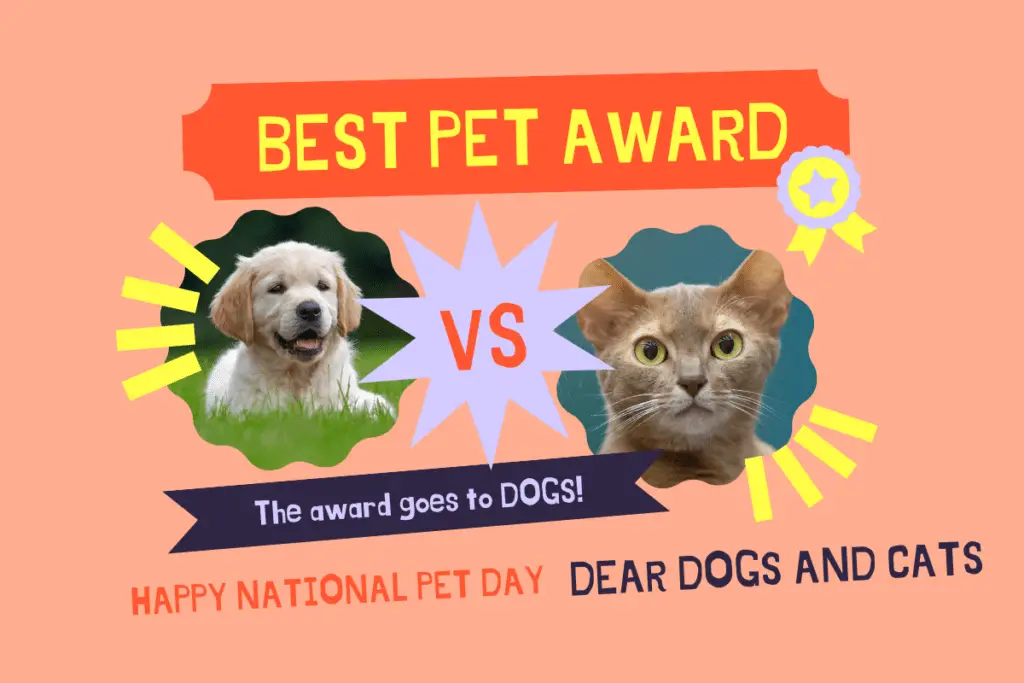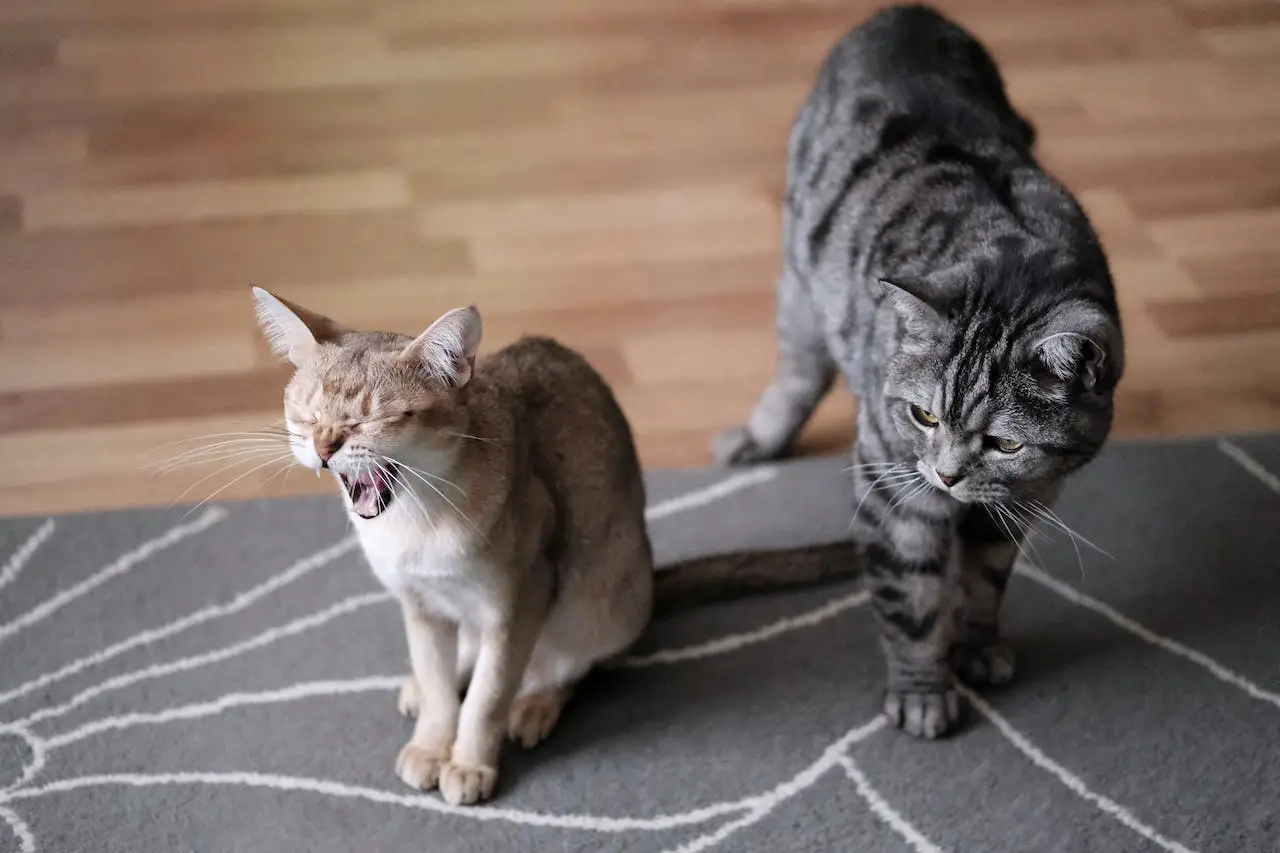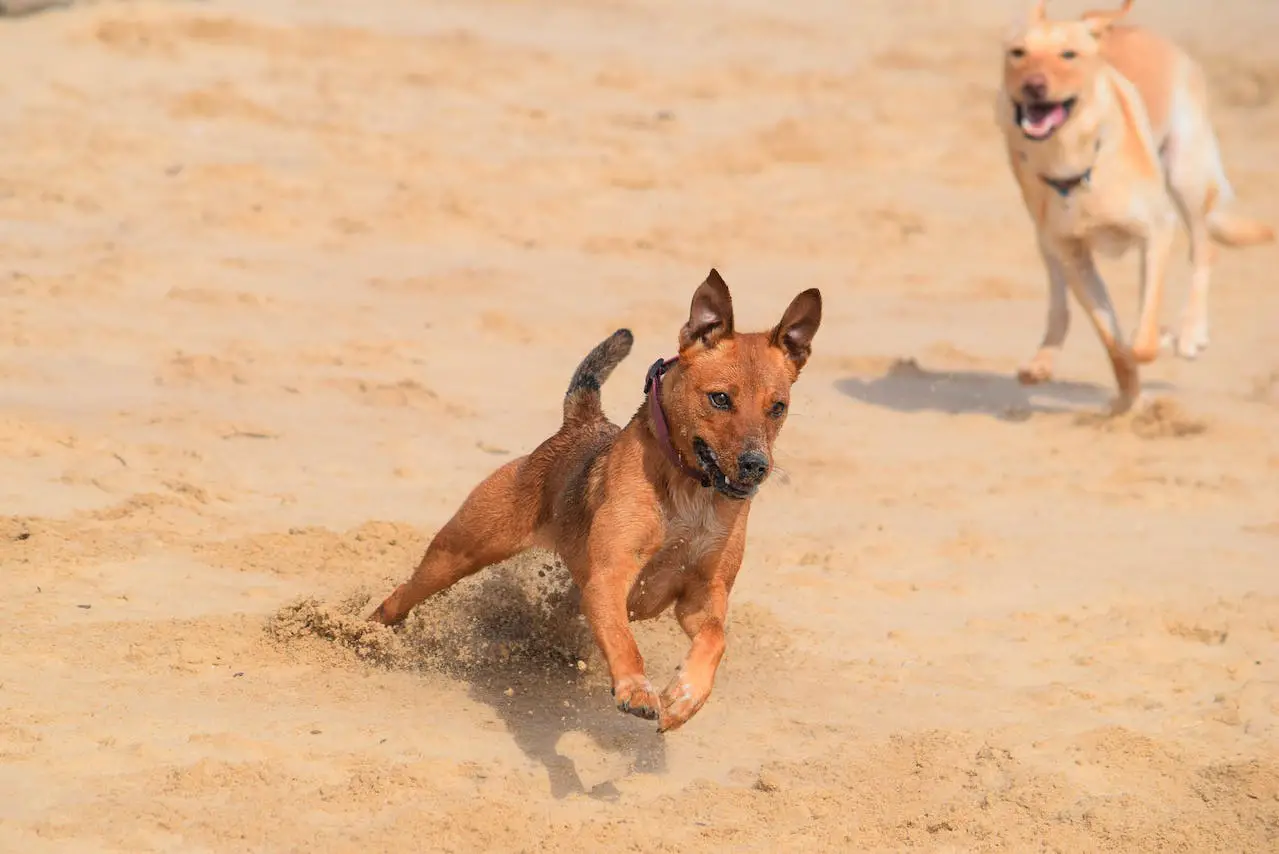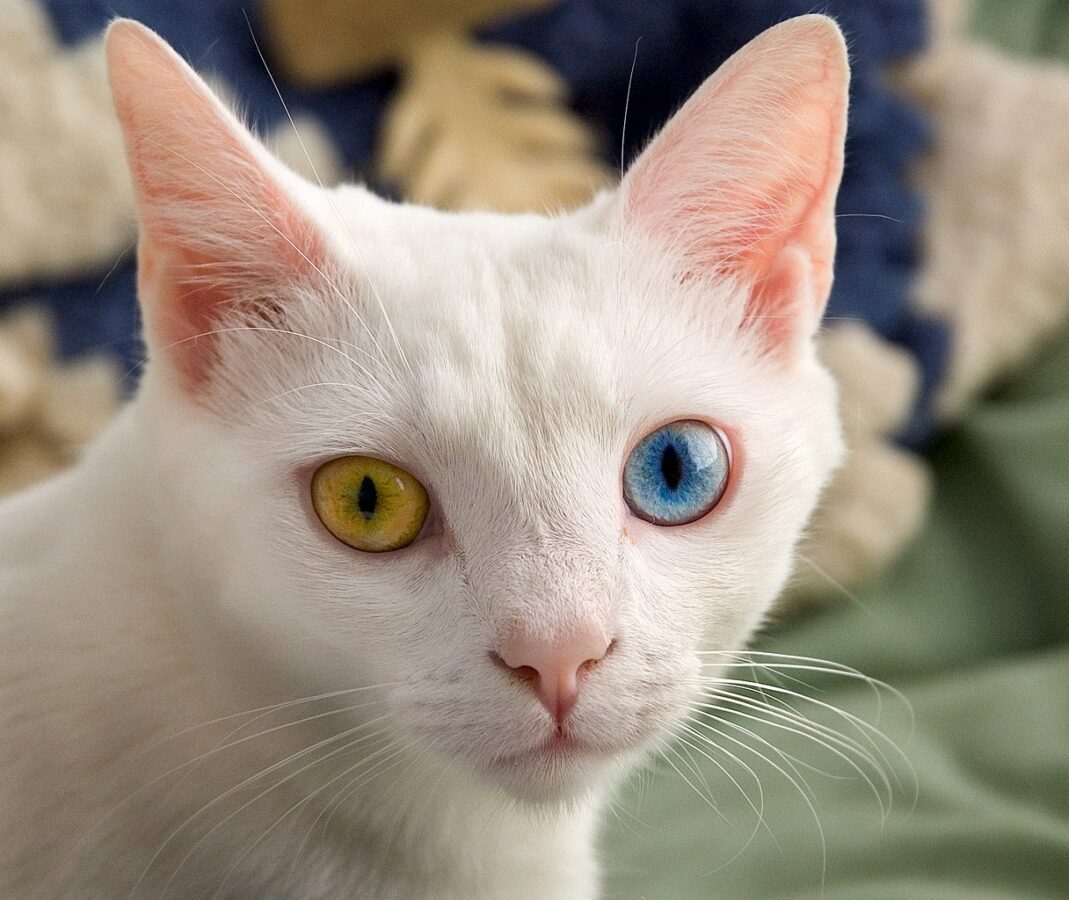The debate about whether dogs are more loyal compared to cats is older than the Chinese Wall.
Yet, cat parents say that their beloved furballs are loyal while dog owners say that their doggos will lay their life for them.
As someone that has been working with cats and dogs for over 10 years, I will try to settle this eternal battle.
- Why Dogs Are More Loyal Compared To Cats
- Why Do Dogs Obey Better Than Cats?
- Cats Personality Traits
- Dogs Personality Traits
- Dogs Were Breed To Help Humans
- Is It True That Cats Have No Loyalty?
- Are Dogs Normally More Affectionate Than Cats?
- Are Dogs or Cats Nicer?
- Do Cats Bond With One Person?
- Do Dogs Bond With One Person?
- In Conclusion
Why Dogs Are More Loyal Compared To Cats

Dogs are generally perceived as more loyal compared to cats due to their social nature, pack mentality, and bonding hormone levels, but it’s important to note that cats can also demonstrate significant loyalty.
Dogs’ Social Nature
By their inherent nature, dogs are more social animals than cats. This is because dogs have evolved from wolves, a species known for their pack behavior.
In a pack, loyalty and cooperation are key to survival, which has translated into domestic dogs’ behavior. This doesn’t mean cats cannot be loyal, but their display of loyalty may look different due to their more solitary nature.
In my years as a veterinarian, I’ve noticed that dogs tend to seek out human companionship more readily than cats. For instance, dogs are usually more eager to please their owners and more consistently responsive to their owner’s emotions.
Hormonal Connections
There is a scientific reason why dogs seem more affectionate and loyal than cats. Dogs have been found to release a hormone called oxytocin – often referred to as the “love hormone” – in interactions with their owners.
This hormone is associated with bonding and trust, and dogs release it at significantly higher levels than cats when interacting with their human companions.
Cats and Loyalty
While dogs may be more overtly social and demonstrative in their loyalty, it’s important not to underestimate cats.
Cats can be truly loyal, but their loyalty often comes out of their desire to be loyal to you, making it even more valuable. Cats may not exhibit loyalty in the same way dogs do, but that doesn’t make it any less real.
Perception Versus Reality
Perception plays a big role in why dogs are seen as more loyal than cats. The behaviors that people associate with loyalty – following their owners around, obeying commands, displaying noticeable affection – are all characteristics more typical of dogs than cats.
However, just because cats display their affection differently doesn’t mean they aren’t capable of deep bonds and loyalty.
See also: Are Cats or Dogs Better For Depression?
Why Do Dogs Obey Better Than Cats?

Dogs have evolved into highly domesticated creatures that are easily trained and obedient.
Dogs possess a remarkable capacity for learning quickly, remembering commands, and responding positively to positive reinforcement.
On the contrary, cats tend to be much more independent-minded creatures who may or may not obey instructions depending on their mood.
Dogs tend to be more people-oriented than cats, meaning they form stronger emotional connections with their owners and enjoy engaging with them.
As such, dogs often respond well to verbal commands – they want to please you!
Furthermore, many breeds of dogs are bred specifically for obedience training, so your pup is likely eager to learn and follow instructions if you provide plenty of encouragement and rewards.
Cats Personality Traits

Cats exhibit a wide range of personality traits, with key characteristics often grouped under terms such as neuroticism, extraversion, dominance, impulsivity, and tolerance.
Neuroticism in Cats
Neuroticism in cats is typically associated with behaviors like being shy, insecure, or anxious. Cats with high neuroticism may be more cautious and may benefit from a calm and secure environment.
As a veterinarian, I’ve seen cats exhibiting these traits often become more relaxed and confident when provided with plenty of hiding spots and consistent routines.
Extraversion in Cats
Extraverted cats are similar to extraverted people. They seem to be energized by being around other people and/or other animals. These cats are typically active, vigilant, curious, and inquisitive. They might enjoy playtime and exploration more than their introverted counterparts.
Dominance in Cats
Dominant cats often display behaviors such as bullying or asserting control over other pets or even their human companions.
Dominance can manifest in various ways, such as territorial behavior or aggression. However, it’s important to understand that this dominance is not a sign of malice but rather an instinctive behavior rooted in their need for security and control.
Impulsivity in Cats
Impulsive cats are often spontaneous and quick to act. This trait can make them fun and playful, but it can also lead to unexpected reactions.
For instance, an impulsive cat might suddenly decide to dart across the room or pounce on a toy without warning. These cats may require more stimulation to keep them engaged and prevent boredom says HelpGuide.
Tolerance in Cats
Tolerance in cats refers to their ability to cope with changes in their environment or routine. Some cats are highly adaptable and take new experiences in stride, while others may struggle with even minor changes says ICatCare.
Understanding your cat’s level of tolerance can help you provide an environment where they feel safe and comfortable.
Dogs Personality Traits

Dogs exhibit a wide range of personality traits, with key characteristics often grouped under terms such as sociability, playfulness, chase-proneness, aggressiveness, and trainability.
Sociability in Dogs
Sociability in dogs refers to their ability to interact positively with humans and other animals. Dogs with high sociability are generally friendly, outgoing, and enjoy being around others.
They often seek out human attention and get along well with other pets. In my years as a veterinarian, I’ve seen how this trait can make dogs wonderful companions and family members.
Playfulness in Dogs
Playfulness is another common trait in dogs, manifesting in their love for games, toys, and interactive activities. Dogs with high levels of playfulness are often energetic and active. They usually enjoy regular playtimes and exercise, which can contribute to their overall health and happiness.
Chase-Proneness in Dogs
Chase-proneness in dogs relates to their instinctive desire to chase moving objects, whether it’s a ball, a squirrel, or a car. This trait can be seen in many dog breeds, especially those bred for hunting or herding. However, it’s important to manage this behavior appropriately to ensure the safety of both the dog and others around them.
Aggressiveness in Dogs
Aggressiveness in dogs can manifest in various ways, such as growling, snapping, or biting. It’s important to note that aggression is not inherently a “bad” trait and can often be a dog’s way of communicating discomfort, fear, or stress.
Understanding and properly managing aggression is crucial for the well-being of both the dog and its human companions.
Trainability in Dogs
Trainability refers to a dog’s ability to learn and follow commands. Dogs with high trainability are often eager to please and quick to learn new tasks or tricks. This trait can make training sessions more enjoyable and successful, leading to a well-behaved pet.
Dogs Were Breed To Help Humans
Dogs have been man’s faithful companion and helper for centuries. Their intelligence, strength, and willingness to please have made them invaluable partners in hunting, herding livestock, or simply providing companionship.
Dogs are fiercely loyal creatures that form deep connections of trust and affection with their owners.
They look to us for guidance and direction, making us eager to please.
This loyalty stems from their dependence on humans for food, shelter, safety, and love – things that they cannot provide themselves.
Dogs demonstrate their devotion and loyalty by protecting their owners from harm or any danger that comes their way.
Even in hazardous situations, dogs remain bravely by our sides to safeguard us says AKC.
Dogs show us unconditional devotion, making them popular pets over the years. A loyal canine can make an amazing addition to any family!
Is It True That Cats Have No Loyalty?
For years, people have debated whether cats exhibit loyalty. While there is no definitive answer, it can be said that cats tend to show less loyalty than dogs do.
Dogs tend to form strong attachments to their owners and show loyalty by greeting them when they return home or following them around the house.
Cats on the other hand tend to have more independent personalities and may not be as vocal or attentive toward their owners all of the time.
They may be quite introverted, preferring to spend time alone rather than seek out human contact.
Nevertheless, cats still demonstrate loyalty towards their owners even if they may not express it in traditional ways like dogs do.
Here is a case study done on dog loyalty by ScienceDirect.
Are Dogs Normally More Affectionate Than Cats?
Yes, dogs are more affectionate than cats and they have a different way of showing it.
How Cats Show Affection
Cats often appear independent and aloof, yet they also possess a deep love and affection towards their owners. Cats express these emotions through body language, meowing, purring, kneading and even giving presents made up of dead prey.
- Body Language: Cats communicate through body language. They may rub against your legs or knock their heads against a hand to indicate they want attention or petting. A cat who appears content will keep its tail up while sitting next to or in your lap, while one who feels secure may curl up into a ball on top of or near you.
- Meowing/Purring: Cats will meow to show their affection for you and if they purr while sitting near or on your lap, that can be another indication of contentment and contentment. Purring can also serve to comfort cats when they feel anxious or scared.
- Kneading: Kneading is an instinctive behavior from kittenhood in which a cat pushes its paws against you in rhythmic motions. It is thought that kneading helps cats relax and feel secure around their owners, showing that the cat trusts you.
- Gifts: Cats enjoy hunting small prey such as mice, birds, and insects for their owners as a sign of affection. Even though it may be messy and gross, remember that this is your cat’s way of saying thank you!
Overall, cats show affection in many different ways. When your cat spends time with you, rubs against you, or meows or purrs when near you, it is showing affection towards you.
How Dogs Show Affection
Dogs express affection in a variety of ways. They can lick you, cuddle up next to you, bring their toys or even just stare with those puppy-dog eyes.
Some breeds may be more vocal than others and bark when they’re happy to see you or excited about something. Additionally, they may nuzzle your hand or leg as an expression of affection.
Another way dogs show their affection is by leaning on you when they’re around. This could indicate they need attention and feel safe being near you.
Dogs also display smiles by showing the whites of their teeth and turning up the corners of their lips in a relaxed manner – usually an indication that they’re contented and contented.
Dogs also show their affection by bringing you gifts. This could include anything from a stick to a shoe or even your favorite toy.
Not all gifts are accepted, but the attempt usually serves as an indication of love and loyalty from your furry friend.
Finally, the best way to tell that your dog loves you is by watching their body language during interactions with them.
Signs such as relaxed facial expressions, wagging tails, licking and play bows all point towards happiness and contentment when in your presence.
Are Dogs or Cats Nicer?

For centuries, people have debated which animal makes better pets: dogs or cats. Ultimately, both animals possess their own individual personalities and it’s up to the owner to decide which works best for them.
Dogs are commonly seen as loyal, loving companions that will always be by your side.
Unfortunately, they require a lot of attention and can take up much of your free time with necessary exercise or playtime.
Furthermore, dogs make excellent guard dogs that will protect you from any potential hazards.
Cats tend to be more independent than dogs but still provide plenty of affection when needed.
Unlike dogs, who require constant attention, cats prefer spending time alone in the house enjoying their company.
Furthermore, cats make excellent hunters and will help keep bugs and other pests away from your home.
It all boils down to what kind of companion you’re after.
If loyalty and affection are top priorities, dogs may be your best bet.
On the other hand, if independence and affection are more your style, cats could be just what the doctor ordered!
Do Cats Bond With One Person?
Yes, cats can form special relationships with people. Usually, it’s someone that feeds them, plays with them, talks to them, and provides them with love and attention.
Cats may follow their favorite person around the house or show signs of separation anxiety when apart.
Though cats may not express themselves as much as dogs do, they still possess an emotional connection that can be nurtured over time. So if you’re searching for a loyal companion – cats could just be it!
Do Dogs Bond With One Person?
Yes, dogs can form strong attachments to one person and tend to prefer their attention. Dogs are highly social creatures and form strong attachments with those they see regularly or who take care of them.
That is why it is essential for owners to spend quality time with their pets.
Ensure they receive enough exercise and mental stimulation.
Dogs may become protective over those they have formed a bond with, particularly if there are perceived threats against them.
Multi-person households may experience different levels of attachment between each member.
Typically the primary caretaker has a stronger bond with your dog.
To ensure your pup bonds with you, give him plenty of love and attention as well as provide him with essential needs like food, shelter, exercise, and training.
FAQs
Q: Do cats show any sign of loyalty towards their owners?
A: Yes, cats can also show signs of loyalty towards their owners. While their behavior might not be as overt as that of dogs, cats often form strong attachments to their owners and show their loyalty through various subtle behaviors, such as following their owners around and seeking their attention.
Q: Can a cat be as loyal as a dog?
A: While cats and dogs have different ways of showing loyalty, it’s possible for a cat to be just as loyal as a dog. Cats may not exhibit loyalty in the same way as dogs, but they can form deep emotional bonds with their owners and display loyalty through their actions and behavior.
Q: What are some signs of loyalty in dogs?
A: Some common signs of loyalty in dogs include constant companionship, eagerness to please their owners, protective behavior, and displays of affection such as leaning against their owners or wagging their tails when their owners are around.
Q: Are there certain breeds of dogs known for their exceptional loyalty?
A: Yes, certain breeds of dogs are renowned for their exceptional loyalty, such as the Golden Retriever, German Shepherd, Labrador Retriever, and Collie. These breeds are often known for their unwavering devotion and dedication to their owners.
Q: How can owners strengthen the bond and loyalty with their dogs?
A: Owners can strengthen the bond and loyalty with their dogs by spending quality time together, providing training and positive reinforcement, engaging in interactive play, ensuring regular exercise, and showing consistent love and care towards their canine companions.
Q: Do dogs feel a sense of loyalty towards their human families?
A: Yes, dogs often feel a strong sense of loyalty towards their human families. Their loyalty is deeply ingrained in their instincts and domestication history, and they consider their human families as their pack, which triggers their protective and loyal behaviors.
Q: Are there any studies supporting the idea of dogs being more loyal than cats?
A: While there are no specific studies proving that dogs are inherently more loyal than cats, the concept of dogs being more loyal is often attributed to their domestication history and the roles they have played alongside humans for centuries.
Q: Can the loyalty of a pet vary based on individual differences?
A: Yes, the loyalty of a pet can vary based on individual differences. Just like humans, animals have unique personalities, experiences, and temperaments that can influence their level and expression of loyalty towards their owners.
Q: Is it fair to make comparisons between the loyalty of dogs and cats?
A: Making direct comparisons between the loyalty of dogs and cats may not be entirely fair, as both species have their own unique ways of forming bonds with their owners. It’s important to appreciate and understand the individual traits and behaviors of each species without pitting them against each other.
In Conclusion
Dogs are more loyal compared to cats and overall tend to obey more.
However, this doesn’t mean that cats are unable to have affection toward their human parents.
It is just that cats have a unique way of showing their loyalty and love.


Leave a Reply